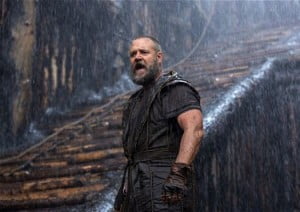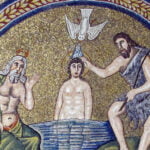 Last Saturday, with some misgivings, I gave in and went to see Noah with my 13-year-old daughter. Some commentators have noted that it is a dark film, but perhaps I was concentrated too much on analysing it to take that in. In fact, overall I found it an enjoyable film, with some stunning acting, and the 2 hours 20 minutes passed quickly—though I am not sure I will be rushing to buy the DVD.
Last Saturday, with some misgivings, I gave in and went to see Noah with my 13-year-old daughter. Some commentators have noted that it is a dark film, but perhaps I was concentrated too much on analysing it to take that in. In fact, overall I found it an enjoyable film, with some stunning acting, and the 2 hours 20 minutes passed quickly—though I am not sure I will be rushing to buy the DVD.
Despite its billing, and the positive reception from some Christians, this is not really a biblical story, but a post-apocalyptic ecothriller plundering the biblical narrative. And plunder it does very well—I think there are many more biblical resonances and allusions than people realise. Of course, the main plot line is drawn from Gen 6–9, with a number of other things mixed in. A number of commentators have noted that some key elements of the Noah story have been missed—the main one being that Shem, Ham and Japheth bring their wives in the biblical story, whereas in the film only Shem has a woman, and she is barren. But this is the first interesting inclusion of a prominent biblical theme from elsewhere—the barren woman who (spoiler alert!) is healed and is delivered of longed-for offspring.
There are several other nice biblical touches.
- Although Noah shuts and reopens the door to the ark several times, the final time it is closed by The Creator rather than by Noah himself.
- The scene where Noah looks to heaven and contemplates the sacrifice he believes The Creator is calling him to make is highly suggestive of the ‘Akedah‘ in Genesis 22, Abraham’s near-sacrifice of Isaac.
- The film includes the post-flood episode where Noah plants the first vineyard, gets drunk, and is found by his children. This episode follows some of the biblical detail closely, including Ham finding Noah first and failing to ‘cover his nakedness’—and I think I even spotted an allusion to the idea that this was a veiled reference to an illicit sexual encounter between Ham and Noah.
- There is quite a powerful, and relatively faithful, re-telling of the creation narrative from Genesis 1–3, told by Noah to his family once sealed in the ark and waiting for the waters to subside. This was done in almost exactly the same way as it was presented in the excellent (and underused) Testament series of videos, in this case in the episode on Creation and Flood. (I am not aware of a scholarly theory that supports this linking—do comment, dear reader, if you know of one.)
But I highly doubt that most viewers would have noticed these. What was more obvious was the addition to the biblical framework of the myth of the Watchers, the fallen angels who came to earth to have sex with beautiful women (see Gen 6.4), from the book known as 1 Enoch. This is part of the ‘Old Testament Pseudepigrapha‘, books that were not part of the Hebrew canon of Scripture, but were circulated quite widely in the New Testament period. Many of them, like 1 Enoch, purport to have been written by famous OT characters, in this case, Noah’s grandfather, but in fact are thought to have been written in the period of Greek and Roman occupation of Palestine. 1 Enoch consists of five distinct parts, and only the first part (chapters 1 to 36) relates to the Watchers. The film suggests they came to assist fallen humankind, though the book depicts them not just as skilled craftsmen but also as corrupting magicians—you can read it for yourself at the online library of Early Jewish Writings. (My favourite part is the list of their names in chapter 6 v 8; Jomjael sounds like he might have been fun!) The book was clearly known amongst the first Christians, and is cited in Jude 1:14–15 (quoting 1 En 1.9 and 60.8).
The film also weaves in a good number of hints at Jewish mysticism; the mineral that produces fire, which the men are hunting for at the beginning of the film, is called ‘zohar’, which means ‘shining’—and is the name of the key text in Kabbalah mysticism, a kind of Jewish gnosticism which emerged in 13th-century Spain, but claims to record oral traditions from the second temple period and earlier. This influence explains why the snakeskin brings enlightenment (a hint that ‘the fall’ was not a bad thing, but a coming of age for Adam and Eve), why Adam and Eve are portrayed as figures of light, rather than having normal bodies, and why the final rainbow is circular, rather than the biblical bow. These influence are explored at length by Brian Mattson.
Despite all these issue, I came away feeling that the Noah film had got one big thing absolutely right. The story of Noah (like others in this part of Genesis) is not a historical account that can translate, with no need for adaptation, into a film script. It is a ‘mythical’ text, in that it makes use of a story to configure the world in narrative terms. It is seeking to tell us something about how the world is, what humanity is like, and the nature of God. That is why I cannot help feeling that explorations of the historical events behind it, or how many animals the ark could hold, are slightly beside the point. The truth of these stories, like Jesus’ parables, lies not in the correlation with historical facts, but in their resonance with the way the world it. As the director himself comments:
To argue about it as if it was a historical event is ridiculous. Which, by the way, goes for atheists, too – the people who do the math and say, ‘Well, all of the animal kingdom couldn’t fit into one boat.’ The whole conversation is ridiculous.
 And this is where we get to the real issue with Noah. Although some Christians have suggested that the film will prompt discussion about what God is like, I personally doubt it, since I think the film actually closes the conversation down. It offers a very clear depiction of The Creator, and a repeated theme is that he is silent. He won’t speak to Tubal-Cain—neither does he speak to Noah. He is silent, distant and callous. (Mattson is right that this derives from the influence of Kabbalah mysticism.) This theme is present throughout the film, but it reaches is climax towards the end, when Noah decides what to do with his grandchildren that have been born on the ark. Since The Creator continues to be silent, Noah must simply follow his dogmatic, religious commitment and kill the children. And it is only the common-sense humanity of other members of the family that changes his mind. Humanity without religion is more moral than The Creator—and his followers. Russell Crowe’s inexpressive, deadpan portrayal captures this religious fanaticism rather well. In the end, Noah triumphs because he listen to his own instinct, and the pleading of his wife and children, and this turns him from the will of The Creator—which is callous, vindictive and inhuman.
And this is where we get to the real issue with Noah. Although some Christians have suggested that the film will prompt discussion about what God is like, I personally doubt it, since I think the film actually closes the conversation down. It offers a very clear depiction of The Creator, and a repeated theme is that he is silent. He won’t speak to Tubal-Cain—neither does he speak to Noah. He is silent, distant and callous. (Mattson is right that this derives from the influence of Kabbalah mysticism.) This theme is present throughout the film, but it reaches is climax towards the end, when Noah decides what to do with his grandchildren that have been born on the ark. Since The Creator continues to be silent, Noah must simply follow his dogmatic, religious commitment and kill the children. And it is only the common-sense humanity of other members of the family that changes his mind. Humanity without religion is more moral than The Creator—and his followers. Russell Crowe’s inexpressive, deadpan portrayal captures this religious fanaticism rather well. In the end, Noah triumphs because he listen to his own instinct, and the pleading of his wife and children, and this turns him from the will of The Creator—which is callous, vindictive and inhuman.
This present us with the apologetic agenda. The director Darren Aronofsky, a humanist, has reworked a biblical story using Jewish mysticism to present an atheist apologetic: humanity is better off without the dogma of religion.
Rather surprisingly, a bit of me doesn’t disagree with this as much as I might—in one important sense. I have argued elsewhere that the Christian faith does not fit the category of ‘religion’ very well in some key respects. Contrary to Noah in the film, the Judeo-Christian tradition is somewhat suspect of people claiming to have heard from God and demanding allegiance on the basis of this. Its theology of the prophetic is both that God does speak, but also that any claim that God has spoken must be tested critically by the community of faith. (See Deut 18 and 1 Cor 12 and 14.)
But it seems to me that this agenda—reasonable humanity is more compassionate than religion—is working itself out in a good number of current debates, not least in relation to sexuality. God is unreasonable, and lacking in compassion—and the Bible shows this, which is why Richard Dawkins offered to fund the distribution of Bibles in schools. However, Aranofsky only manages to make this point by removing key elements of the story—that Noah was in a different moral category from the rest of humanity, that God’s plan was restoration of Eden, not obliteration of humanity, and that the end of the story is God’s grief over what has happened. This underlies the other hidden dynamic at work here: atheistic understandings of morality are in fact dependent on the religious tradition that they argue against, as Theo Hobson points out:
The new atheists are now hitting the intellectual buffers. The problem that confronts them is as stark as it is simple: our morality has religious roots. Put another way: when God is rejected, the stakes are gulpingly high; the entire moral tradition of the West is put in question.
Christians need to offer a robust account of faith that is moral and compassionate. And that needs to be matched by practice: Christian faith needs not just to be moral, but to be seen to be moral. That is the real challenge the film Noah sets out before us.
(And what did my daughter think? ‘I enjoyed it—they were right about how evil people are. That is why Jesus had to die for us. But I didn’t like the characterisation of Noah. I wish they’d got a Christian to check it out first so that they could get him right.’)




























Fascinating. Not sure whether I want to see it or not … probably I will!
Well, I think you will view it slightly differently having read this commentary. I had read Brian Mattson blog and it made a real difference in what I was looking for…
I found the film fascinating! Watching it here in Brazil, I was unsure why the Portuguese subtitles kept using the word “Senhor” (Lord) when the characters only refer to “him” or “the creator”. Is there a hint in the silence regarding the name of God that in the pre-Mosaic age this was still unrevealed (despite the frequency of it in the actual Genesis accounts)? As for the Watchers, things are somewhat turned on their head. It would be difficult to find Second Temple accounts portraying the Watchers in a positive light, genuinely “helping” humanity. Also, when killed, they return to the creator – a far cry from 1 Enoch 10! I liked the climactic scene at the end of the film – in a new, unexpected way Noah becomes a type of Abraham. And here is something that I think many have missed: God in his mercy preserves humanity and at the end of the story Noah exercises mercy and humanity is preserved. The imago dei theme present in the film thus comes full circle, ultimately Noah proves that he is a human being created in the image and likeness of (a mysterious but merciful) God, in other words, he proves himself to be qualified for the job of restarting the human race. Thanks for the post Ian – by the way, Brazilian Christians (at present 40 million “evangelicals”) are generally reacting quite negatively to the film.